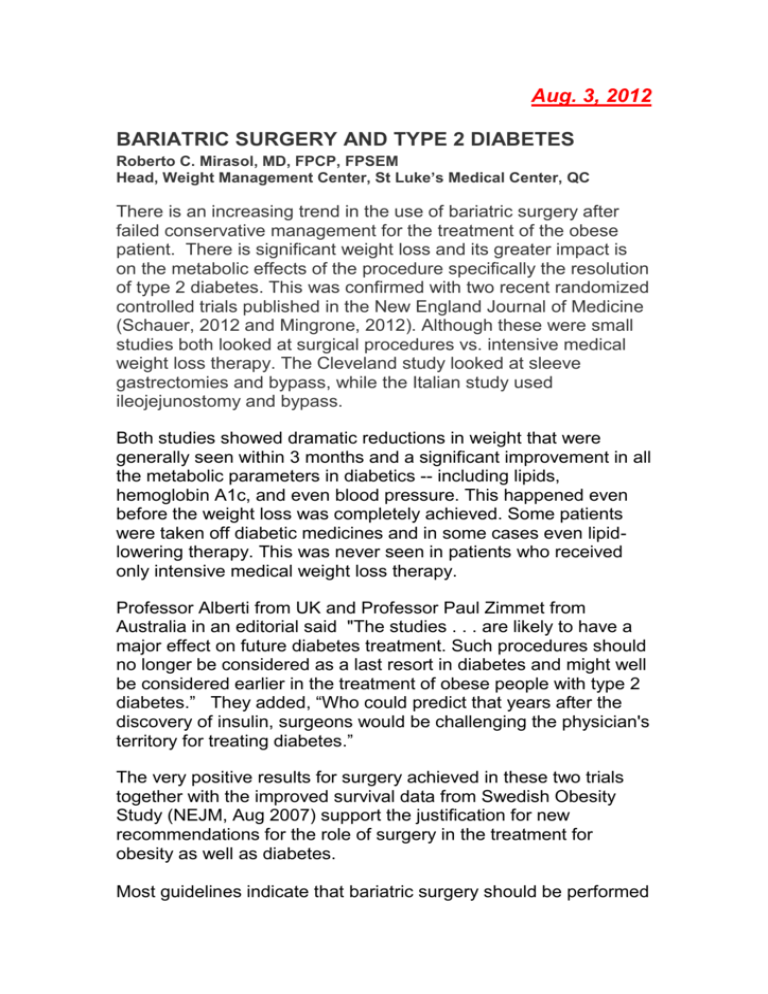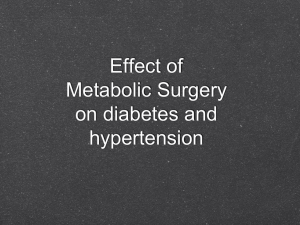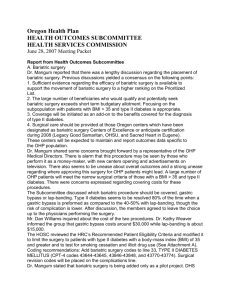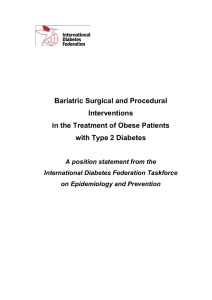Aug. 3, 2012 BARIATRIC SURGERY AND TYPE 2 DIABETES
advertisement

Aug. 3, 2012 BARIATRIC SURGERY AND TYPE 2 DIABETES Roberto C. Mirasol, MD, FPCP, FPSEM Head, Weight Management Center, St Luke’s Medical Center, QC There is an increasing trend in the use of bariatric surgery after failed conservative management for the treatment of the obese patient. There is significant weight loss and its greater impact is on the metabolic effects of the procedure specifically the resolution of type 2 diabetes. This was confirmed with two recent randomized controlled trials published in the New England Journal of Medicine (Schauer, 2012 and Mingrone, 2012). Although these were small studies both looked at surgical procedures vs. intensive medical weight loss therapy. The Cleveland study looked at sleeve gastrectomies and bypass, while the Italian study used ileojejunostomy and bypass. Both studies showed dramatic reductions in weight that were generally seen within 3 months and a significant improvement in all the metabolic parameters in diabetics -- including lipids, hemoglobin A1c, and even blood pressure. This happened even before the weight loss was completely achieved. Some patients were taken off diabetic medicines and in some cases even lipidlowering therapy. This was never seen in patients who received only intensive medical weight loss therapy. Professor Alberti from UK and Professor Paul Zimmet from Australia in an editorial said "The studies . . . are likely to have a major effect on future diabetes treatment. Such procedures should no longer be considered as a last resort in diabetes and might well be considered earlier in the treatment of obese people with type 2 diabetes.” They added, “Who could predict that years after the discovery of insulin, surgeons would be challenging the physician's territory for treating diabetes.” The very positive results for surgery achieved in these two trials together with the improved survival data from Swedish Obesity Study (NEJM, Aug 2007) support the justification for new recommendations for the role of surgery in the treatment for obesity as well as diabetes. Most guidelines indicate that bariatric surgery should be performed only in patients with type 2 diabetes who have BMIs of >35 kg/m2. The International Diabetes Federation guidelines also in addition recommend bariatric surgery as a reasonable treatment option in those with a BMI of 30 to 35 "if the patient has poorly controlled diabetes." These studies suggest other areas for future research. These include durability of remission, effect of surgery on more advanced diabetes, the relative risk/benefit of other bariatric procedures, and the impact of surgery on secondary complications of diabetes such as blindness, renal failure, and cardiovascular events. More randomized controlled trials involving more number of patients should be undertaken. Zimmet and Alberti caution, however, that surgery is not yet "the universal panacea for obese patients with type 2 diabetes." Both studies had relatively small sample sizes and short duration, which are important limitations, they note. And bariatric surgery is associated with perioperative risks and potential long-term problems due to micronutrient deficiencies, both of which need to be considered. More studies are needed, "particularly those that may provide better prediction of success and the expected duration of remission and long-term complications," they conclude. Although these two studies provide strong evidence for bariatric surgery as an effective treatment for type 2 diabetes, we must place more focus on diabetes prevention in order to reduce the impending burden of diabetes for generations to come.







